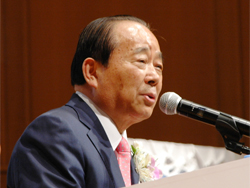Commemorative Speech “Love Goes Beyond Borders”
Grand Prize:MR. MOTOI TAUCHI

We lost a special woman in Mokpo City in South Korea about 42 years ago. At her funeral approximately 30,000 attendees gathered and shed many tears for the loss of Ms. Chizuko Tauchi.
She was a housekeeper without any wealth or assets but this is her story and explains why there was such a turnout at her funeral.
It takes a great deal of courage to dedicate one’s life to supporting orphans. She lived her life by ‘Love with No Fear’ just as it says in God’s Book.
Everyone, please write down the word ‘parent’ in Kanji (Chinese character). We can see a group of 3 radicals all together meaning ‘stand on a tree and watch’. Parents watch their children walk away, eventually viewing them from the top of the tree as time passes and they walk further away. This is how children are raised by parents.
What in the world would happen to the children who lost their parents and who had not met Ms. Chizuko Tauchi?
Children need to be loved and so learn the importance of loving one another. However, not all children get to be loved.
Today, in our society of industrial priorities and high competition, we have an increasing number of people who place material things before love. A side effect of valuing privacy is that neighbors are gradually becoming less involved in each others lives. In such an environment, children are experiencing many difficulties. We hear with alarmingly increasing frequency stories of mothers murdering their own children, or of children committing suicide.
We must all take it into account and consider measures for the loveless children.
A civil society means a community that carries out its responsibilities to raise those who are not beloved by their parents.
The pioneering community was Kyoseien Foster Home that was founded in Mokpo, South Korea by my parents based on their life-time dedication.
We need to be loved to learn how to love.
Victims feel pain for a long time while perpetrators can move on quickly, sometimes avoiding responsibility.
Japan committed two crimes on South Korea.
Firstly Japan invaded the weakened people with its strength and power, and secondly Japan implemented assimilation policies during the Annexation of Korea. They forced Koreans to become Japanese. No differences were tolerated.
Everyone, both Japanese and Korean disagreed with the marriage of Chizuko Tauchi and Yun Chi Ho, except one person. Haru, Chizuko’s mother, encouraged her daughter by saying “Marriage is not confined within the relations of countries but it stands between a man and a woman. Under the kingdom of God, there is no distinction between Japanese or Korean because we all are God’s children”.
Ms. Chizuko Tauchi served as a bridge between South Korean and Japan.
In reconciliation, perpetrators must admit their guilt by apologizing and the victims must forgive. By doing this, they mutually accept the relationship with an open mind and this, I believe, is how we can come together.
After the Second World War, things had turned around. My father, Yun Chi Ho was berated for being friendly towards Japanese, and my mother, Chizuko Tauchi, was bullied as the Japanese wife of a Korean man. It was this moment that the orphans stood against the bullies with sticks in their hands and tears in their eyes. They said “Don’t you dare touch my father or my mother” and put up a spirited defense.
Chizuko then understood with deep emotion that people from different cultural backgrounds could share the truth and this valued the history of Kyoseien Foster Home.
The children fostered with love had learnt how to love.
We need to be loved to learn how to love.
This is the essence of life.
When Chizuko Tauchi first met my father Yun Chi Ho, he only had one room in a barrack with no curtains, no doors, no electricity or gas supply. He was looking after orphans with straw flip-flops on, as he had no proper pair of shoes.
My mother was stunned by this beautiful sight because his eyes were still happy and his heart was still pure despite this hardship. She was touched and later, they decided to marry.
My father went missing during the hardest time amongst the chaos of Korean War. My mother lost her life-time partner with whom she navigate many challenges and difficulties. She must have experienced such grief that words cannot express.
The government of South Korea presented Chizuko Tauchi with the Order of Culture under her Japanese name on 15th August, 1963, the first award to a Japanese woman. This was before the diplomatic normalization between the two nations.
My mother Chizuko Tauchi passed away on her 56th birthday on 31st October, 1968. Mokpo City held the first citizen’s funeral since the opening of the port for a dedicated Japanese woman and 30,000 people gathered in their deep grief.
I had learned from the citizens of Mokppo the importance of a society that prioritizes humanity over national origins.
Later, I took on the position of my parents and became the father of 320 orphans at the age of 26. This was when South Korea’s GNP marked 169 USD and it was the period that the entire country was financially challenged. Four years later, I also married a Japanese woman. I drew excellent support from her, especially as she had studied social welfare at Doshisha University.
My wife who emerged as the mother of orphan’s successor valued the relationship with the citizens of Mokpo. The citizens of Osaka City had donated funds to build the ‘Osaka Ai-no Ie’ (Osaka House of Love, an additional house in Mokpo Kyoseien Foster Home) and it is used as an orphans’ dormitory. They had presented love and hope to the children.
Nevertheless, we found new lives abandoned at Kyoseien Foster Home every day so we opened a temporary shelter for abandoned children. We suffered deeply when we had to send one child to the hospital as we found him abandoned outside the foster home late at one winter’s night. This is why we established Kyosei Family Consulting Center in the premise of the foster home where people could talk first rather than just dropping children off.
Despite their best efforts, graduates of the foster home cried in disappointment when they were unable to find work and become self sufficient. They said, “Dying younger would have been better than being dumped and to suffer so much at 18”.
Just as we were opening the youth vocational school to support the children’s independence, we received some mail from the ‘Shufu-no Tomo’ (Friends of Housewives), a lady’s magazine in Japan.
A short history my mother wrote was published in the magazine.
“The only wish I would like to realize is to provide children who are able to graduate and leave Kyoseien Foster Home with jobs.”
Her wish motivated me and revitalized my spirit.
As I read the story, I was even more astounded.
“Our first son Yun Ki (Mr. Motoi Tauchi’s Korean Name) has so much resemblance to his father. I am very pleased that he now studies social work”.
In fact, when I told her I wanted to study social welfare, she argued in tears.
“This work is just like Beethoven’s unfinished piece in that it is neverending. It is a continuous cycle of sending off the grown-ups and adopting new abandoned children. The hardship should end in our generation. You must follow your own path”.
The eyes of youngsters studying at the youth vocational school were filled with hope.
“We will have a strong will!”
“We will be capable people!”
“We will love our neighbors!”
“We will become citizens who pay taxes!”
The school encouraged many people to take pride in themselves and the institution has developed to become a career college for citizens of Seoul. Its graduates are now working very hard across the world’s five oceans and the six continents.
We opened our office in Tokyo to support Japan and South Korea to come together and to share the warmth of our hearts with all Asian people.
In 1983, as Japan realized the issue of its aging society, I heard of an elderly Korean resident of Nagoya who had died a solitary death.
In an economic giant like Japan, elderly people should not have to die alone.
When dying alone in a remote foreign land, the person must have recalled their homeland, brothers, sisters, and parents and said in Korean, “I want to eat kimchi (traditional Korean pickled vegetables).”
I became upset thinking how sad it would be to die alone after having come to Japan all the way from home, experiencing grief due to war and being forced into hard labor amidst the restoration of Japan after the war.
Chizuko Tauchi was even called the mother of all Korean orphans thanks to the 50 years of life-time dedication to raising orphans in South Korea. During this time, she adjusted to the Korean culture, however, her last words were, “I want to eat umeboshi (traditional Japanese picked plums)” in Japanese.
That moment, I believed, her spirit was returning to her homeland where it was most culturally at ease. I then understood for the first time that the easiest language and the best food for her were both Japanese.
I could not do much, but I wrote to the Asahi Shimbun’s speaker’s column my intention to establish a senior people’s home equipped with Ondol (Korean-style under-floor heating) where elderly Korean residents in Japan could speak in Korean and eat kimchi.
I also thought that opening a senior people’s home for Korean residents in Japan is a sign of the social conscience of the Japanese people.
People told me.
“The Japanese will not do anything that has no precedent.”
“The license will not be granted.”
“Japanese firms will not fund it.”
“The Japanese will return with all kinds of objections to your expectations.”
“Quit.”
I hit many brick walls.
There were, for example, the brick walls of institutions, mentality and differences in perception.
However, I told a lady in her late 70s who opposed the idea of building a senior people’s home for Korean residents in Japan that I would present a society where both Japanese and South Korean people live in harmony, to her grandchildren.
She showed a hint of understanding by saying, “It may be possible”.
By opening a senior people’s home, I learnt that the Japanese people are honest, hard working and kind. These are the words my mother used to say when she raised me.
One Korean man in his 80s called on Kokyo-no Ie and said to me when I was guiding him in, “I have lived and hated the Japanese up to this age. I was always ready to retaliate as soon as we gained back some power. But, having come to this place and watched those young Japanese men providing care to the Korean elders, I felt that hatred fading away. Times are changing for the better. I would like to play my part here, too.”
A 12-year-old girl, Kim Hye Yun had studied at the youth vocational school in Seoul and later, she won the gold medal in the Abilympic Games and opened a vocational school in Botswana in Africa. She aspired to study a master’s degree in social welfare at Columbia University and this year, she completed that degree. Apparently she is now planning to visit other countries.
Love goes beyond borders.
We help each other. We love each other.
I believe this is the meaning of living together.
The spirit of living together that once started to flourish in the suburban Mokpo City is making me dream that tomorrow it will spread all over the world.
Thank you very much.
Kam Sa Ham Ni Da.
